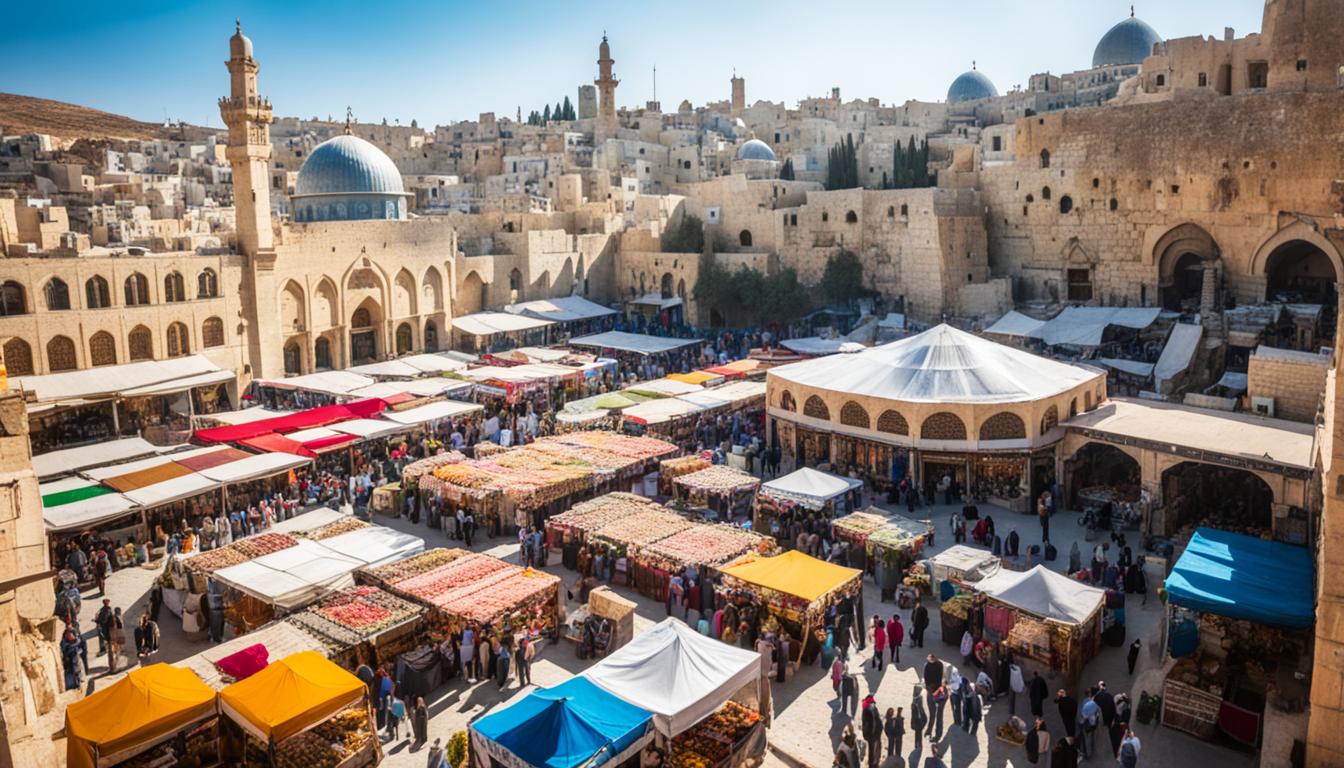Ever thought about the hidden spots and amazing experiences in the Palestinian Territory? It’s full of ancient sites and delicious food. Get ready for an adventure that will change how you see things. You’ll learn a lot about Palestinian culture and heritage.
Key Takeaways
- Uncover the rich history and cultural diversity of the Palestinian Territory
- Discover iconic landmarks, such as the Church of the Nativity and the Dome of the Rock
- Experience the unique hospitality and traditions of the Palestinian people
- Explore the stunning natural landscapes, including the Dead Sea and nature reserves
- Savor the flavors of authentic Palestinian cuisine
Meet the Palestinian People at a Homestay or Bedouin Camp
Experience the heart of Palestinian culture by staying at a homestay or visiting a Bedouin camp. These places let you connect with the local community and learn about their life.
Experience Traditional Bedouin Hospitality
Enter the world of the Bedouin people and see their famous hospitality. Live with a Bedouin family in their camp and enjoy a meal cooked over an open fire. Learn about their nomadic life and see the Bedouin dance.
Immerse Yourself in Palestinian Culture
Staying with a Palestinian family lets you dive deep into the region’s culture. Share meals, join in daily activities, and talk with locals to really get to know the Palestinian way of life. This kind of tourism gives you a real and memorable look into Palestinian culture.
“Staying with a Palestinian family was the highlight of my trip. I learned so much about their traditions, customs, and way of life. It was an incredibly enriching experience that I’ll never forget.”
Explore the Ancient Old City of Jerusalem
The walled Old City of Jerusalem is a captivating place to wander. It has narrow stone passageways, bustling markets, and iconic religious landmarks. As you explore, you’ll see the contrast of cultures and faiths that have shaped it over centuries.
Marvel at the Iconic Dome of the Rock
The Dome of the Rock is a symbol of Jerusalem. It’s an Islamic shrine on the Temple Mount. Finished in 691 CE, this golden dome is a masterpiece of Middle Eastern architecture. It shows the city’s deep religious importance.
Pray at the Western Wall
The Western Wall, or Kotel, is sacred for the Jewish faith. Millions visit each year. It’s a remnant of the ancient wall that surrounded the Jewish Temple. Here, you can join in prayer and see the rituals of this tradition.
| Key Facts About the Old City of Jerusalem | Details |
|---|---|
| Size | Roughly 220 acres (one square kilometer) |
| Number of Gates | 11 gates, with 7 open to the public |
| Accessibility Improvements | $20 million Shekel ($5.75 million) project to enhance accessibility for handicap patrons in specific areas |
| Jewish Quarter History | Dates back to roughly 1400, featuring the rebuilt Hurva Synagogue and the Cardo, a preserved section of a Byzantine road |
| Western Wall Significance | The last standing wall from the Second Temple, holding significant religious importance for the Jewish faith |
| Dome of the Rock Dimensions | Measures 160 feet (50 m) long by 60 feet (20m) high |
| Al Aqsa Mosque Capacity | Can accommodate up to 5000 worshipers |
As you walk through the Old City of Jerusalem, you’ll see the mix of historical sites and religious landmarks. You’ll be amazed by the Dome of the Rock and the Western Wall. This ancient city shows the rich cultures that have lived here.
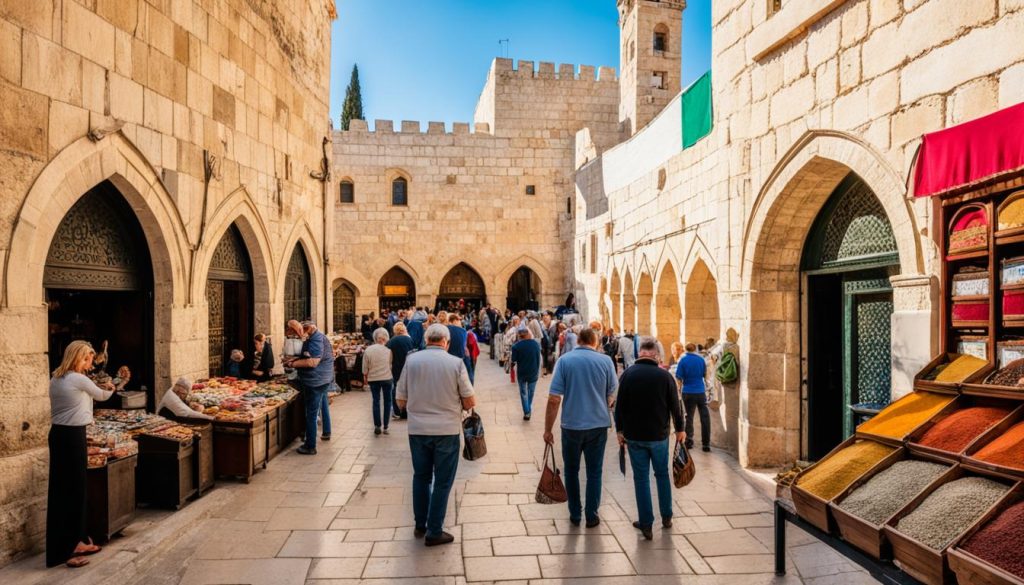
Witness Traditional Dabke Dance Performances
The Dabke dance is a key part of Palestinian culture, seen at weddings and festivals. It’s a mix of circle and line dancing with high energy. Dancers do half kicks and twirls, making it a memorable event.
This dance has deep roots in the Levant region, going back centuries. It’s known for its rhythmic stomping and synchronized moves. These show the rich culture of the Palestinian people.
At celebrations, skilled Dabke dancers show off their skills. Their footwork, along with the audience’s clapping and ululation, creates a captivating show. It pulls people into the lively Palestinian culture.
“Dabke dance is not just a performance, it’s a celebration of our identity, our resilience, and our unwavering connection to our homeland.” – Rania, a Palestinian cultural ambassador.
Seeing a Dabke dance is an immersive experience. It helps visitors appreciate the traditional Palestinian dance and cultural performances. These are key to keeping the Dabke dance alive.
Hike to Historic Monasteries in Kidron Valley
The Kidron Valley is in the heart of the West Bank. It’s known for its ancient history and spiritual importance. Hikers can explore Byzantine monks’ caves here, showing the history of historic monasteries.
Discover the Mar Saba Monastery
The Mar Saba Monastery is a key spot in the Kidron Valley. It’s a 5th-century monastery that clings to the hillside. Today, a small group of monks lives there, keeping old traditions alive.
Getting to the Mar Saba Monastery is a rewarding hike. It’s 19.8 kilometers long and takes about 6-7 hours to complete. You’ll need lightweight boots, walking poles, water, snacks, sunscreen, a hat, and a camera for the views.
A hearty lunch is provided, so you won’t go hungry. The hike is moderately hard. It’s perfect for those who love adventure and want to see the area’s history and beauty.
“The Kidron Valley is a truly special place, where the past and present converge in a breathtaking natural setting. Hiking to the Mar Saba Monastery is a must-do experience for anyone seeking to discover the historic and spiritual heart of the West Bank.”
Experience the Israeli West Bank Barrier in Bethlehem
The Israeli West Bank Barrier is a strong symbol of the ongoing conflict. In Bethlehem, this barrier has become a canvas for street art. These murals show messages of protest, oppression, and hope for peace. Visitors can see this public art and understand the Palestinian people’s reality.
See the Powerful Street Art on the Separation Wall
The Separation Wall in Bethlehem is about 8 feet high and has watchtowers, cameras, and barbed wire. Artists have turned it into a canvas. You’ll see famous works like “Girl Frisking the Soldier” and “Flower Thrower” by Banksy, among others.
Bethlehem has a population of 25,000 and is in the West Bank. It’s known for the Church of the Nativity, a UNESCO site. Near Bethlehem, over 20 Israeli settlements show the ongoing conflict.
Visiting the Separation Wall lets you see the Aida Refugee Camp, started in 1950 for refugees from 17 villages. The camp highlights the displacement and hardship of the Palestinian people.
Going to Bethlehem and seeing the Separation Wall is a moving experience. It makes you think about the Israeli-Palestinian conflict and the Palestinian people’s strength.
Delve into Palestine's Rich History
The Palestinian Territories are full of historical wonders. They offer a chance to explore the region’s captivating past. Jericho is a key spot, with the ancient Hisham’s Palace ruins. This 8th-century winter retreat shows the area’s rich history.
Hisham’s Palace is in Jericho’s heart, a site that wows visitors worldwide. Built during the Umayyad dynasty, it has stunning mosaics and detailed architecture. It’s full of historical artifacts that tell the region’s story.
Walking through the ruins takes you back in time. You’ll see the amazing designs and the palace’s huge size. From the mosaic floors to the tall columns and fancy archways, every part shows the region’s rich Palestinian history and creativity.
Jericho itself is full of historical sites. It’s one of the oldest cities in the world. Its ancient ruins and artifacts let you see the region’s past.
If you love history or adventure, visiting Hisham’s Palace and Jericho is a must. It’s a key part of exploring the Palestinian Territories. So, start your journey and discover this amazing region’s secrets.
“Jericho is one of the oldest continuously inhabited cities in the world, with a history that stretches back thousands of years. Exploring the ruins of Hisham’s Palace is like stepping back in time, allowing visitors to immerse themselves in the rich cultural heritage of the region.”
| Interesting Facts About Hisham’s Palace |
|---|
| – Built in the 8th century during the Umayyad dynasty |
| – Served as a winter palace and resort for the Umayyad rulers |
| – Boasts stunning mosaics, intricate architectural details, and a wealth of historical artifacts |
| – Located in the ancient city of Jericho, one of the oldest continuously inhabited cities in the world |
| – Provides a fascinating glimpse into the region’s rich Palestinian history |
Palestinian Territory: Best Things to Do - Top Picks
The Palestinian Territory lies between the Jordan River and the Mediterranean Sea. It’s a place of ancient history, vibrant culture, and stunning nature. You can explore the West Bank’s famous landmarks or dive into the Gaza Strip’s traditions for an unforgettable trip.
Here are the best things to do in the Palestinian Territory:
- See the ancient historical sites, like Hisham’s Palace in Jericho, one of the oldest cities in the world.
- Visit the nature reserves and see the beautiful landscapes, including the Dead Sea.
- Learn about Palestinian culture by trying traditional Bedouin experiences or watching the Dabke dance.
- Check out the religious landmarks in Bethlehem, like the Church of the Nativity, a UNESCO site.
- Taste the authentic Palestinian cuisine, from Nablus’s olive oil soap to delicious local dishes.
The Palestinian Territory has a lot to offer, whether you want culture, history, or nature. It’s a place for unforgettable experiences.
| Location | Highlight | Significance |
|---|---|---|
| Bethlehem | Church of the Nativity | UNESCO World Heritage site, oldest continuously operating church since 326 AD |
| Hebron | Burial place of biblical patriarchs and matriarchs | Significant for Judaism and Islam |
| Jericho | One of the oldest cities globally, over 10,000 years old | Archaeological treasure trove |
| Qasr al-Yahud | Jordan River site associated with John the Baptist and Jesus | Important Christian pilgrimage destination |
Experience the Palestinian Territory’s captivating world. Discover the best things to do that will touch your heart and mind deeply.
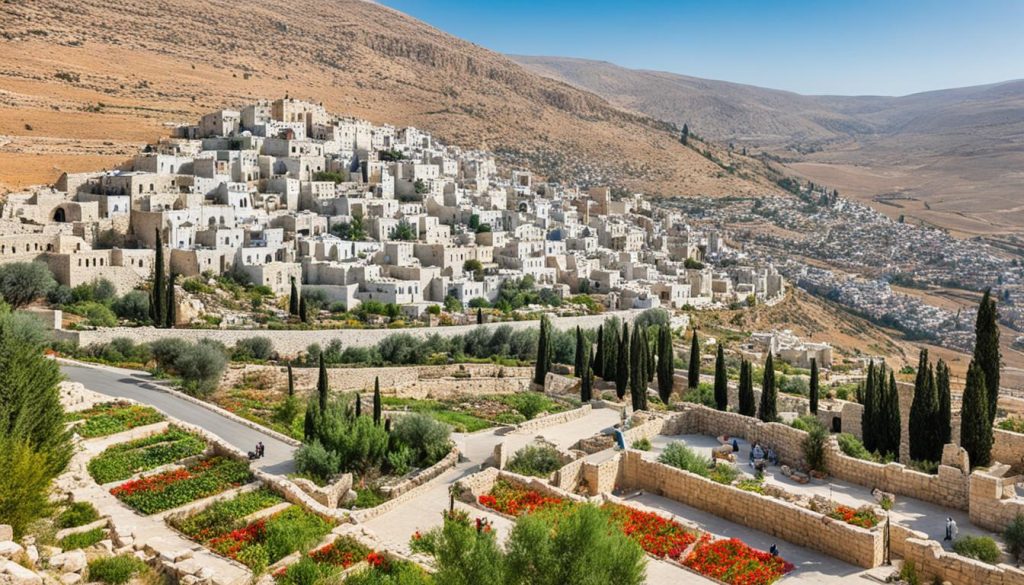
Savor Authentic Palestinian Cuisine
Dive into the world of Palestinian cuisine and taste the rich culture of the region. Enjoy dishes like the famous mansaf, a mix of lamb and rice. Or try refreshing juices made from local fruits. Each taste takes you on a trip through Palestine’s diverse food traditions.
Palestinian cooking is all about using fresh, local ingredients. Olive oil brings a unique flavor to many dishes. Fresh herbs like parsley and mint add color and taste. Spices like za’atar and cinnamon create a mix of aromas that excite your senses.
When you visit local markets, you’ll see a wide variety of fruits and vegetables. Buying from these markets supports the local community and brings true flavors to Palestinian meals.
| Signature Palestinian Dishes | Key Ingredients |
|---|---|
| Mansaf | Lamb, yogurt, rice |
| Tabbouleh | Parsley, bulgur, tomatoes, onions, lemon juice |
| Fattoush | Lettuce, tomatoes, cucumbers, pita chips, sumac |
| Mujadara | Lentils, rice, onions |
| Sfiha | Durum wheat flour, all-purpose flour, minced meat |
Experience the heart of Palestinian cuisine by taking a cooking class or visiting a local home. You’ll learn about the traditions and cultural importance of these dishes. Whether you’re at a family gathering or exploring markets, your journey through Palestine’s food will be memorable.
“Palestinian cuisine is a tapestry of flavors, woven together by the land, the people, and the enduring traditions that have been passed down through generations.”
Explore Nature Reserves and the Dead Sea
In the Palestinian Territories, there’s a world of stunning natural beauty waiting for you. Beyond the rich culture, you can dive into the region’s nature reserves and the famous Dead Sea.
The Dead Sea is a must-see, being the lowest point on Earth at 423 meters below sea level. It’s shared by Jordan, Israel, and the Palestinian Territories. With a salinity of 33.7%, it’s almost 10 times saltier than regular seawater. This makes it a unique place where you can float easily in its mineral-rich waters.
Close by, Bethany Beyond the Jordan is a key religious spot. It’s where John the Baptist baptized Jesus Christ. It’s just a short drive from the Dead Sea.
The Dana Biosphere Reserve is perfect for nature lovers. It’s Jordan’s biggest nature reserve, covering 308 square kilometers. It’s home to over 215 bird species, including endangered ones like the Syrian serin and lesser kestrel. The Ajloun Forest Reserve, at 13 square kilometers, lets you see wildlife like boar, foxes, hyenas, wildcats, and roe deer.
Looking for a relaxing float in the Dead Sea or an adventure in nature? The Palestinian Territories have lots to offer. They let you connect with nature and see the beauty of this amazing place.
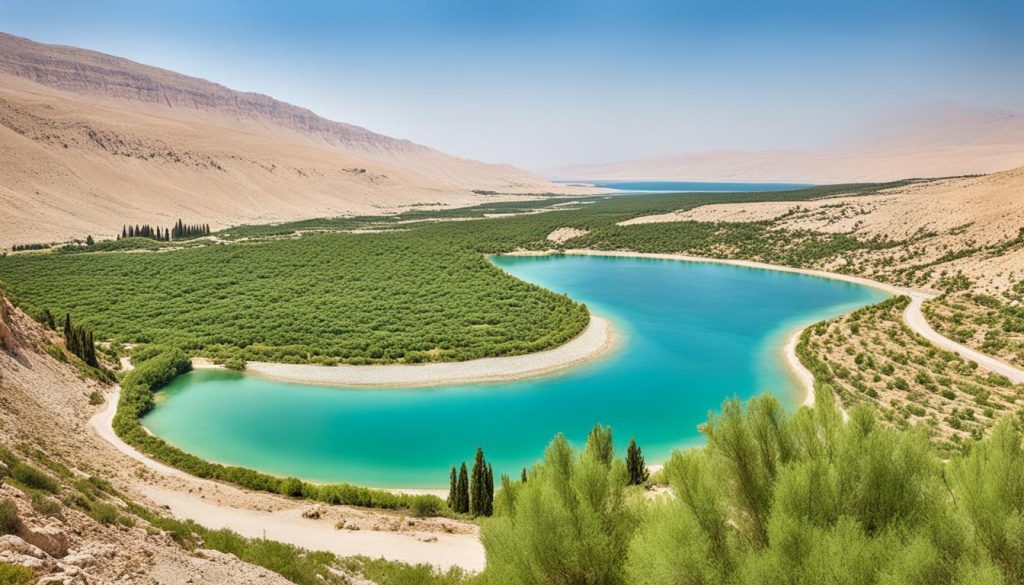
Visit Ancient Religious Sites in Bethlehem
Bethlehem is famous for being the birthplace of Jesus. It’s a place where people from all over the world come to visit. You can walk the historic pilgrimage route and feel the city’s deep spiritual roots. See the famous landmarks that have lasted for centuries, each with its own story.
Walk the Pilgrimage Route
Start your trip at the Church of the Nativity, built in the 4th century. It’s right where Jesus is thought to have been born. The church’s design is a mix of Byzantine, Crusader, and traditional Palestinian styles, making it truly stunning.
Next, head to the Milk Grotto Chapel, a place of great importance. It’s where the Holy Family is said to have hidden during a tragic event. Going down into the grotto, you’ll feel the calmness and understand Bethlehem’s deep spiritual value.
- Discover the historical and cultural importance of Bethlehem’s religious sites
- Explore the Church of the Nativity, a UNESCO World Heritage Site and one of the oldest churches in the world
- Visit the Milk Grotto Chapel, a sacred space where the Holy Family is believed to have sought refuge
Walking the pilgrimage route, you’ll notice Bethlehem’s deep faith. The city’s ancient sites are more than just landmarks. They are doors to the past, connecting us to the area’s deep spiritual history.
“Bethlehem is the birthplace of our Savior, and the Church of the Nativity is a powerful reminder of the city’s enduring spiritual significance.”
Discover Gaza Strip's Historic Landmarks
The Gaza Strip is a place of rich history and culture, despite its tough situation. It shows the strength and pride of the Gazan people. Visitors can dive into the area’s fascinating past.
The Great Omari Mosque is a key site in Gaza, dating back to the 8th century. Its beautiful design and tall minarets show the area’s deep religious and cultural roots. Close by, the Church of St. Porphyrius highlights Gaza’s diverse religious history.
The Gaza Archaeological Museum is great for those who love history. It has many artifacts like pottery, jewelry, and sculptures. These items tell the story of Gaza’s past as a place where many cultures met.
| Historic Landmark | Significance | Condition |
|---|---|---|
| Great Omari Mosque | 8th-century Islamic architecture | Withstood the test of time |
| Church of St. Porphyrius | Represents the ancient Christian roots of the Gaza Strip | Maintained and open to visitors |
| Gaza Archaeological Museum | Impressive collection of ancient artifacts | Continues to preserve the region’s archaeological heritage |
The Gaza Strip also shows off its lively culture. The Friday Market (Souq al-Jum’a) is a place of vibrant sights, sounds, and smells. Here, you can try traditional Palestinian food and crafts. Workshops let you learn about pottery, embroidery, and weaving.
Even with its challenges, the Gaza Strip’s people show great resilience. It’s a place with a deep history and culture. Whether you like history, food, or crafts, Gaza offers a memorable visit.
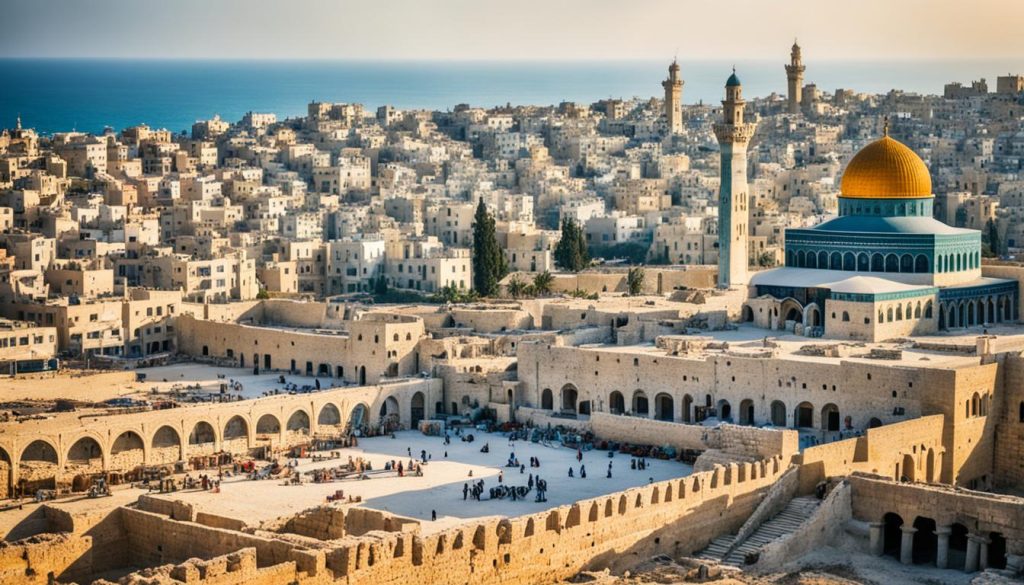
“The Gaza Strip may be one of the most isolated spots on Earth, but its historic landmarks and cultural sites are a testament to the region’s enduring spirit and resilience.”
Conclusion
As we wrap up our look at the Palestinian Territory, it’s clear this place is full of wonders. You can dive into the culture, history, and nature. Your trip will be both enriching and unforgettable.
You’ll get to try authentic Palestinian food, hike in stunning nature, and see the Israeli West Bank Barrier. This guide has shown you the many experiences waiting for you. By connecting with the people and understanding their story, you’ll appreciate the region’s strength and culture more.
When planning your trip, keep an open mind and a curious heart. Dive into the traditions, visit historic sites, and let the place touch your soul. Doing this, you’ll make memories that last and help bridge cultural gaps. This can lead to a more peaceful future for all.
